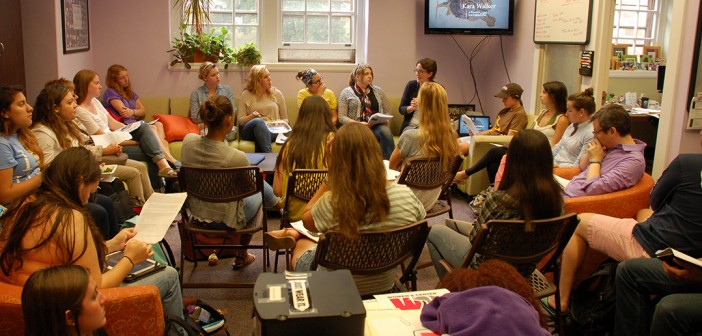The Women’s Center is constantly buzzing, and those who are involved with it seem to be unwavering in their devotion to its mission. This explains the impressive turnout at this week’s Brown Bag Lunch, one in a series that is held nearly every Tuesday afternoon in the Women’s Center.
The discussion topic for this week was Kara Walker’s massive 75-foot long sphinx art installation at the Domino Sugar Factory in Brooklyn, which lies on the edge of the East River. The sphinx was on display through July 6. The factory has since been demolished, paving the way for new luxury waterfront condos, and Walker was commissioned to pay the last homage to the iconic building.
The installation was called “A Subtlety, or the Marvelous Sugar Baby, An Homage to the unpaid and overworked Artisans who have refined our Sweet tastes from the cane fields to the Kitchens of the New World on the Occasion of the demolition of the Domino Sugar Refining Plant.” Walker is known for almost comically long and flowery descriptions of her pieces.
“There was celebration of the black woman as the eighth wonder of the world, as a woman who, despite all these disparaging things, despite the revealing of her genitalia, was just there regally saying you can do whatever you want, but you cannot ignore my presence in this,” Associate Professor of Art Berrisford Boothe said upon seeing the piece.
The installation aimed to raise awareness about the exploitative history of sugar and the many lives of black slaves lost to refine healthier raw brown cane into white, nutritionally vacant refined sugar. But this piece worked on more than just these two levels; everyone at the Brown Bag Lunch who had gone to the exhibition noted that there was an unruly and inappropriate, mostly white crowd there, which seemed to be missing the point. This contrasted greatly with a somber black crowd, which seemed to have a transcendental experience while viewing the piece. Some instances of this contrast, which wasn’t a perfect division between the behavior of different races, can be found on Instagram under the hashtag #KaraWalkerDomino.
Only two people in the room, which was filled with more than 30 faculty and staff members and students, had actually seen the installation.
The Women’s Center Brown Bag Lunches have such a positive reputation that people come expecting great content and conversation regardless of the subject matter or their fluency in it. Anyone who has ever been in a leadership position can likely understand how difficult it can be to rally and organize students, but the Brown Bag Lunches are a testament to how effortlessly the Women’s Center seems to attract discussion — to the point where people are willing to stand for an hour in the back of a crowded room during their lunch hour just to be a part of the dialogue.
While the session consisted mostly of various professors recounting and analyzing their experiences at the installation and their sociological implications, the students present didn’t seem to regard the subject matter as a lecture environment, but rather as a conversation to engage in.
“It’s still happening, and these (Chinese Apple) factories are so disgusting and have nets outside the buildings so people can’t jump and kill themselves,” Lindsay Alexander, ’15, said. “It’s a problem, and that was their solution. It’s so sick (that) these things are still going on in the world, and yet people are still going to buy iPhones and still buy Domino Sugar.”
Kara Walker’s provocative work gives rise to the discussion on modern slavery and the attitudes of those who wish to pay homage to slaves or ignore the issue altogether. The Women’s Center acts as a sounding board for these discussions, starting with the groundwork and encouraging students to reach their own conclusions.






Comment policy
Comments posted to The Brown and White website are reviewed by a moderator before being approved. Incendiary speech or harassing language, including comments targeted at individuals, may be deemed unacceptable and not published. Spam and other soliciting will also be declined.
The Brown and White also reserves the right to not publish entirely anonymous comments.